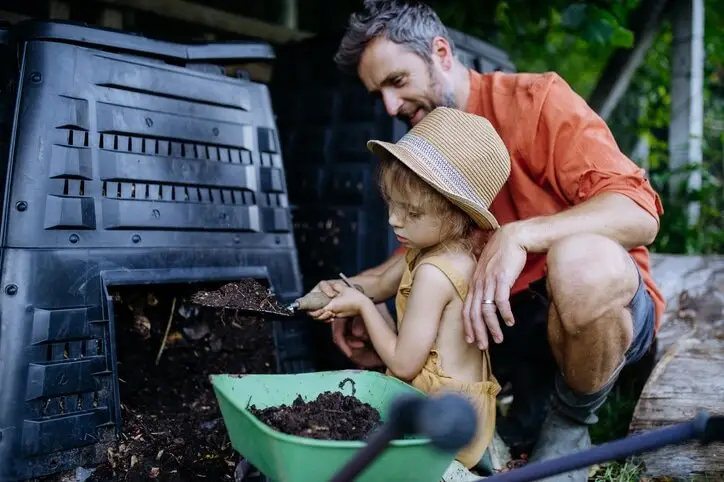How to reduce waste and live more sustainably through composting

Composting is a great way to reduce waste and live more sustainably. By turning food scraps and yard waste into nutrient-rich soil, you can help to reduce your impact on the environment, while also improving the health of your garden or plants. Here are some tips for getting started with composting:
Understand the Basics of Composting:
Composting is the process of breaking down organic materials, such as food scraps, leaves, and grass clippings, into a nutrient-rich soil amendment. Composting requires a balance of carbon-rich materials, such as dried leaves or newspaper, and nitrogen-rich materials, such as food scraps or grass clippings. The compost pile should be kept moist, but not too wet, and turned regularly to promote aeration and decomposition.
Choose the Right Composting Method:
There are many different methods for composting, from traditional outdoor compost piles to worm composting systems. The right method for you will depend on your space, lifestyle, and composting goals. Some popular composting methods include:
Outdoor Compost Pile: An outdoor compost pile is a simple and effective way to compost organic materials. Simply gather your compostable materials in a pile, and turn it regularly to promote decomposition. You can also use a compost bin or tumbler to contain the pile and keep animals out.
Vermicomposting: Vermicomposting involves using worms to break down organic materials into nutrient-rich soil. This method is particularly useful for those with limited outdoor space or those who want to compost indoors.
Bokashi Composting: Bokashi composting is a Japanese method of composting that involves fermenting organic materials in an airtight container. This method is particularly useful for composting meat, dairy, and other difficult-to-compost materials.
Collect and Store Your Compostable Materials:
To compost effectively, you will need to collect and store your compostable materials. This may include food scraps, yard waste, and other organic materials. You can store these materials in a dedicated compost bin or container, or simply keep them in a covered container in your kitchen.
Monitor Your Compost Pile:
To ensure that your compost pile is decomposing properly, you will need to monitor it regularly. Check the moisture level and turn the pile regularly to promote aeration and decomposition. You may also want to monitor the temperature of the pile, as a hot compost pile can help to kill weed seeds and pathogens.
Use Your Compost:Once your compost is ready, you can use it to improve the health of your garden or plants. Simply spread the compost over your garden beds or mix it into the soil around your plants. Compost can also be used as a top dressing for lawns or as a soil amendment for potted plants.
Benefits of Composting
Composting offers a range of benefits for both the environment and your garden. Here are just a few of the benefits of composting:
Reduces Landfill Waste: By composting your organic materials, you can reduce the amount of waste that goes to landfills. This can help to reduce methane emissions and other greenhouse gases, which are harmful to the environment.
Improves Soil Health: Compost is a nutrient-rich soil amendment that can help to improve the health of your soil. Compost can help to improve soil structure, retain moisture, and provide a source of nutrients for your plants.
Reduces the Need for Chemical Fertilizers: By using compost as a soil amendment, you can reduce your reliance on chemical fertilizers, which can be harmful to the environment and human health.
Reduces Water Usage: Compost can help to improve soil water-holding capacity, which can reduce the need for irrigation and help to conserve water.
Saves Money: Composting can help to save money on fertilizer and soil amendments, as well as reduce waste disposal costs.
Supports Biodiversity: Composting can help to support biodiversity by providing a habitat for beneficial microorganisms and insects, which can help to improve soil health and support plant growth.
Conclusion:
Composting is a simple and effective way to reduce waste and live more sustainably. By composting your organic materials, you can help to reduce your impact on the environment, improve the health of your garden or plants, and save money on fertilizer and waste disposal costs. Whether you choose to compost outdoors, indoors, or with worms, there are many different methods for getting started with composting. By making composting a part of your daily routine, you can make a positive impact on the environment and promote sustainability in your own life.
References:
- U.S. Environmental Protection Agency. (2017). Composting at Home. Retrieved from https://www.epa.gov/recycle/composting-home
- The Ohio State University. (n.d.). Composting for the Homeowner. Retrieved from https://ohioline.osu.edu/factsheet/hyg-1640
- Cornell Waste Management Institute. (2013). What is Composting? Retrieved from http://compost.css.cornell.edu/
Disclaimer
The information provided in this article is for educational and informational purposes only and is not intended as medical advice. It is not a substitute for professional medical advice, diagnosis, or treatment. Always seek the advice of a qualified healthcare provider with any questions you may have regarding a medical condition. The author and publisher of this article are not responsible for any adverse effects or consequences resulting from the use of any suggestions, preparations, or procedures described in this article.

